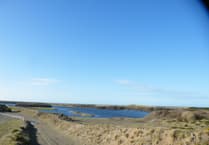A charity is calling on the island’s schools and youth groups to take part in the world’s largest wildlife survey.
For more than two decades, charity Royal Society for the Protection of Birds’ (RSPB) Big Schools’ Birdwatch has enabled a million children to discover birdlife in their local area, and in turn contribute to real-life conservation science.
It says that at a time when nature is in crisis and young people are worried about the future, this survey gives them an opportunity to take part in ‘positive and meaningful action’.
Every year, more schools and youth groups take part, according to RSPB. In 2022 alone, children counted over 95,000 birds in UK and Isle of Man schools.
This vital data feeds into the even longer running RSPB Big Garden Birdwatch (started in 1979 and this year taking place from January 27 to 29).
Manx BirdLife says: ‘It’s a great activity to inspire the next generation to cherish and protect our island’s wild birds.
‘This year’s Big Schools’ Birdwatch runs from January 6 to February 20, so there is still time to get your young people involved.
‘The survey itself only takes an hour and is a great opportunity for outdoor and cross-curricular learning with links to science, maths, and ICT.
‘Birds also make a wonderful theme for literacy and the arts.’
It adds: ‘The Big Schools’ and Big Garden Birdwatches enable scientists to create a snapshot of how birds are doing, and conservationists to aid in their recovery.
‘Even our most familiar birds are in trouble.
‘There are more than five million pairs of house sparrows in the UK, but scientists are worried because their numbers are falling.’
Any teachers or youth group leaders needing help with their birdwatch, Manx BirdLife’s education manager Anna Graham will support them.
Before going outside to complete the survey, Manx BirdLife says it helps if children can learn a bit about the birds they are likely to see.
Images and key information about these species, as well as survey sheets, can be found in the resource pack.
If available, binoculars can help in identifying birds but are not essential.
Only birds within the grounds are counted, not those flying overhead.
According to the charity, it’s important to record the highest number of each species seen at any one time, and not the total number as this could lead to the same bird being counted more than once.
The results are then collated, and the highest number of each species seen is submitted via the RSPB website.
Last year, woodpigeon was the most recorded species, with blackbird a close second.
Manx Bird Life said: ‘It will be interesting to see which species comes out on top this year, and which have dropped down the list and need more help from Manx BirdLife and RSPB.’
If you don’t have time to take part in the RSPB Big Schools’ Birdwatch this year, but still want to make a difference for birds in your school, Manx BirdLife offers free advice and practical support in improving your grounds for wildlife.
The survey is taking place until February 20, 2023.
For information on how to get involved, search online for RSPB Big Schools’ Birdwatch where you can sign up for your free resource pack.





Comments
This article has no comments yet. Be the first to leave a comment.